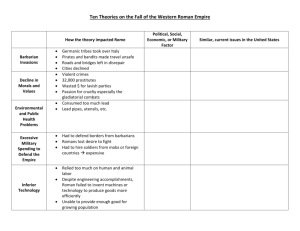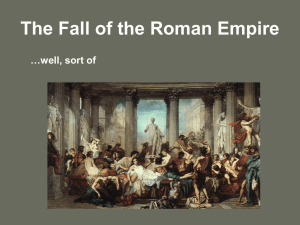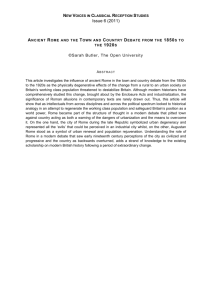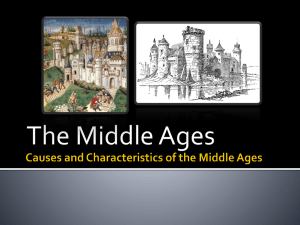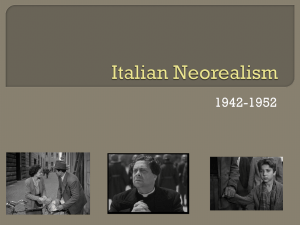Why did the results of Han China`s decline differ from those of the
advertisement
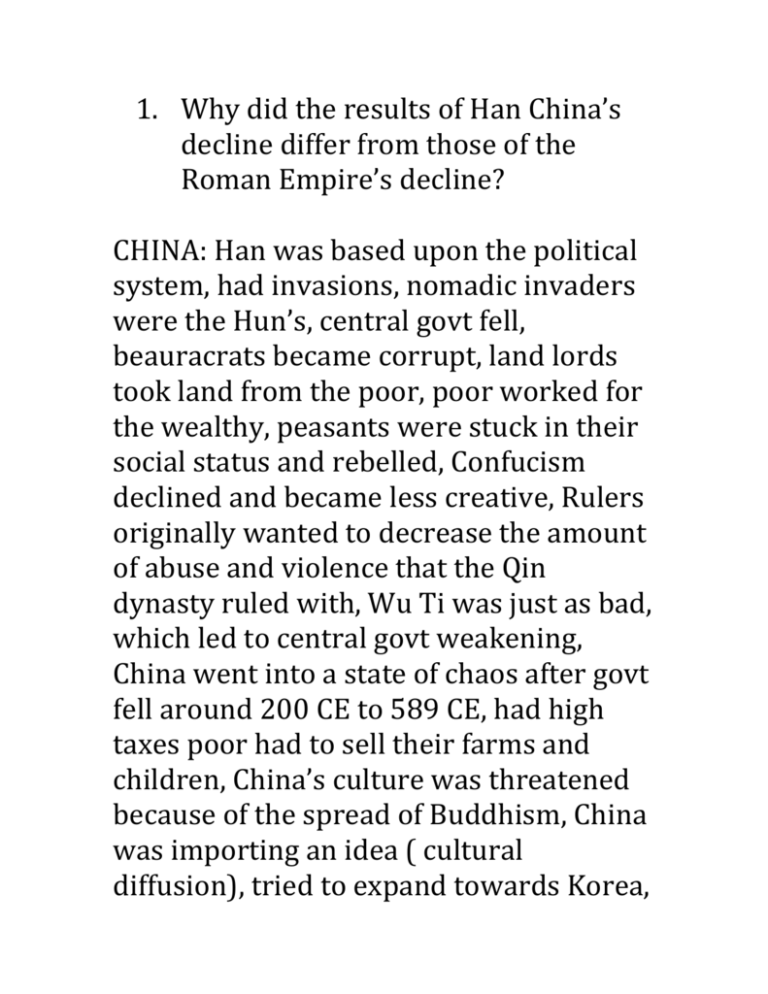
1. Why did the results of Han China’s decline differ from those of the Roman Empire’s decline? CHINA: Han was based upon the political system, had invasions, nomadic invaders were the Hun’s, central govt fell, beauracrats became corrupt, land lords took land from the poor, poor worked for the wealthy, peasants were stuck in their social status and rebelled, Confucism declined and became less creative, Rulers originally wanted to decrease the amount of abuse and violence that the Qin dynasty ruled with, Wu Ti was just as bad, which led to central govt weakening, China went into a state of chaos after govt fell around 200 CE to 589 CE, had high taxes poor had to sell their farms and children, China’s culture was threatened because of the spread of Buddhism, China was importing an idea ( cultural diffusion), tried to expand towards Korea, Indochina and Central Asia, open ways for India to come into China, opened trade routes and Cultural Influences, had a large population decrease because of Invasion and disease, 184 CE Daoist started a revolution, healing and magic, called themselves the yellow turbins and promised a golden age, students demonstrated against government morality, government was untruthful and protested because of government corruption, as the dynasty grew weaker tax revenue declined; had internal rebellions, after protest brought into a Civil War, over threw the Han and epidemics killed ½ of the population, the epidemics caused 3 centuries of chaos, Isolation, could not get help from others when low on food supplies, invasions, made trade difficult, put merchants down on the social class, made it difficult for them to trade and collect taxes, Invaders couldn’t create a more elaborate for of government. ROME: didn’t have a central religion, people were killed by plague, couldn’t recruit citizens for military service, population declined because of disease (measles), hard time collecting taxes so empire fell on hard times, many people fled in poverty and some died and others turned to religion, upper class lost their devotion to politics because of bad economics and turned to pleasure seeking and lost your morals, Rome had to turn to Germany for mercenaries for defense ( have to pay for solders, lack loyalty, know your weaknesses, using state money to pay, Rome had very little tax revenues, internal dissention), Christianity began to gain influence, Diocletian tried to political loyalty for his own personal gain, Constantine introduced Christianity as his own faith in hopes reversing the tide of Rome, Rome broke into 2 parts, broke into East and Weston Roman empires and they didn’t communicate much, Some citizens had a problem with Christianity because the State was not first, Christians didn’t like Diocletian because he wanted to be considered a god and be worshiped as a god, desire for territory expansion caused many invasions which led to the loss of territory, after the East / West split Germany came in and started to make their own kingdom, 5% of German invaders took over Rome, Greece and Rome did not share bureaucratic traditions and no way for others to pick it up after Rome fell, had Civil Wars, generals wanted more power, peasants rebelled of high taxes, when Rome fell it spilt in 3 zones that became the starting points of 3 civilizations called Byzantium, Kingdom of the Visigoths and Ostrogoths, not all 3 parts fell at the same time which did not allow any one group to take over, all tried to regulate their economy in their own zone which lowered tax revenue and the government had less power, peasants welcomed the Germanic Tribes and made it easier for the take over, Eastern Emperor Justian lost a lot of Provinces, Eastern Empire will have more power, Civilization was more entrenched. DIFFER: ROME FELL INTO PIECES, CHINA RESTORED AND KEPT THEIR GOVERNMENT, ROME DIDN’T ETHICAL PHILISOPHY WHERAS CHINA DID, ROME INFLUENCE BY MANY CULTURES; CHINA WAS ISOLATED. QUESTION 2: Compare the major beliefs and religious organization of Christianity and Buddhism. Christianity: the guidance of saints, we not tolerant of other belief systems, Jesus was their leader, placed emphasis on church organization, had an emphasis on a simple life and a spiritual equality of all people, placed a premium on missionary activity and wide spread conversions, believed in a single god, god loves humankind despite earthly sin, started off as a Jewish priesthood until Jesus came, are under the leadership of the pope, believed in an afterlife in heaven and that is where they meet with god, worked against slavery, emphasized in sexual restraint, god sent Christians to earth to redeem human sin, was attractive to rich and poor for the promise for salvation and treated women equally in regards worship, believed after Jesus died he will come back and will bring the end of the world, had Christian doctrine (the Bible), completely devoted to their god, believed that God is made of 3 people; the holy trinity, father, the son, and the holy ghost, God sent Jesus as the “perfect” sacrifice for the sins of the world, believed in baptism. Buddhism: had a central figure called Buddha, believed that if a person lived “saintly” they could obtain Nirvana (state of perfection/happiness/enlightment/ spirituality), changed from a religion based on ethics to an emotional cult offering salvation, believed prayers and rituals could help ordinary people, evolved further to China after the fall of the Han dynasty, spread through the teachings of monks to have Buddha seen as the divine, spread to east Asia and called Mahayana or the greater vehicle, believed that their souls resided in a super heaven after death and could receive prayers and aid people, had a big effect on women and led them to live a more meaningful life, had Bodhisattvas and helped encourage the religion after Buddha’s death, accepted the truth behind reincarnation after death, souls do not die, come back as a different being depending on how they lived their life (cow), to find enlighlightenment one had to abandon their selfish desires or earthly things, whole villages created shrines to Buddha, were organized with priests, temples, creeds and rituals, Confusist leaders found that Buddhist beliefs in the afterlife were a diverversion from political interests, saw it as a threat because it would serve as a distraction from being loyal to the emperor, Buddhism came to China it divided into different versions of the faith because of conflicting views on morals. QUESTION 3: WHAT WERE THE MAIN FACTORS IN ROME’S DECLINE? WHICH DO YOU JUDGE MOST IMPORTANT? WHY? Did not have a central religion, couldn’t recruit an effective Army, were more centered on centralizing their government instead of their surroundings, difficult to collect because people did not have money because of disease / measles and the plague which wiped out 75% of the population, had to hire Germanic mercanaries, Rome’s upperclass became more pleasure seeking which turned them away from their political devotion and economics vigor, Germans eventually invaded them, it was under aristocratic control through popular voice, political confusion produced weak leaders, landlords began to obtain greater political authority / more than the emperor, because of pleasure seeking child rearing became less important, REASON FOR DECLINE AND WHY? Plesure seeking and not having children, because it did not increase the overall population, which you cannot have a civilization, cannot have solders, governmental systems, and taxes, instead of furthering their knowledge they wrote more textbooks. To many personal wants and needs of the emperors caused the lower classes to give up land to landlords because of frequent invasions from Germanic Tribes for protection, Invaders were welcomed. No central religion caused people to pleasure seek, see above for reasons. Plague and disease desimated the population by 75% which decreased tax collection, military, see above reasons. Aristocrats and Emperors began to fight for power of who was left. QUESTION 4: EXPLORE THE DIFFERENCE IN THE EASTERN AND WESTERN PORTIONS OF THE ROMAN EMPIRE. HOW DID THESE DIFFERENCES ARISE? IN WHAT WAYS CAN IT BE ARGUD THAT THE ROMAN EMPIRE SURVIVED IN THE EASTERN MEDITERRANEAN EVEN AFTER IT COLLAPSED IN THE WEST? East: were active in trade and had good agriculture, were artistically creative, centered in Constantinople and traded with the Muslims, created by Constatine, further by Justinian, Diocletian; Justinian tried to recapture the heritage of Rome in the east, Dioclitian wanted the people to worship the emperor as a God, Constatine set up a second capital city to regulate the empire more efficiently, tried to use Christianity to unify the empire and adopts Christianity on his death bed as the “official religion”, had fewer pressures from invaders, named themselves the Byzantium Empire. West: events in the east made it worse in the west because they centralizing the power in the east, were being invaded by the Germanic tribes, division weaken the western western half, poor attempts to regulate the economy tax revenues decline, had a hard time trading with around Italy and France because Germanic kingdoms and developed in those parts, had a loss of comprehension and understanding the doctrine of Augistine and the inability to write write well, Christianity could not sustain the sophisticated culture of literature or art, system was not organized at all picking a new emperor meant very little and loses power, Army deterioriated and put up little fight when Germans invade, plague and disease wiped out population, QUESTION 5: TAKING INTO ACCOUNT BOTH EGYPT AND KUSH, WHAT WERE THE MAIN FEATURES OF CIVILIZATION IN AFRICA PRIOR TO THE FIRST CENTURY C.E? EGYPT: based around a pharaoh and had monks and priest and son would get the throne, was polytheistic, built tombs for pharaohs in which would house all of their positions in to the Pyramids, writings were hiroglyphics and mastered the use of Iron, were advanced in math, had slaves, were conqured by the Kushites, had very lively art which reflected their views on the afterlife, architure were very influential, maintained a unifed state throughout their history, economy was more govenmnet driven, because of government control it made the pharaohs godlike.
